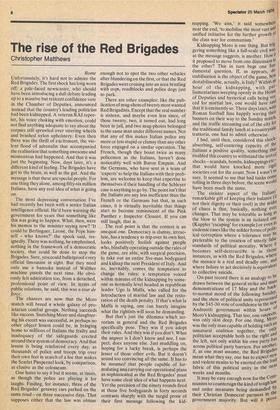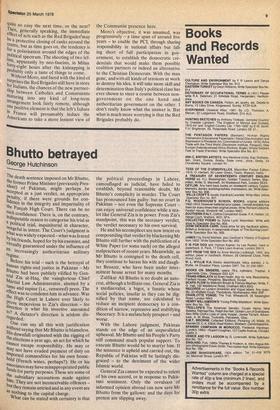The rise of the Red Brigades
Christopher Matthews
Rome Unfortunately, it's hard not to admire the Red Brigades. The first shock has long worn off: a pale-faced newscaster, who should have been introducing a dull debate leading up to a massive but reticent confidence vote in the Chamber of Deputies, announced instead that the country's leading politician had been kidnapped. A veteran RAI reporter, his voice choking with emotion, could not find anything adequate to say about the corpses still sprawled over steering wheels and brushed nylon upholstery. Even then there was the thrill of excitement, the violent flood of adrenalin that accompanied the realisation that something awesome and momentous had happened. And that it was just the beginning. Now, days later, it's a different kind of feeling. The Brigades have got to the brain, as well as the gut. And the message is that these are special people. For one thing they alone, among fifty-six million Italians, have any real idea of what is going on.
The most depressing conversation I've
had recently has been with a senior Italian intelligence official. He'd been warning the government for years that something like this was going to happen. What, then, were his memos to the minister saying now? 'It could be Berlinguer, Leone, the Pope himself — who knows?' the spook said, resignedly. There was nothing, he emphasised, nothing in the framework of a democratic society, that could be done to stop the Brigades. Sure, you could bulletproof every official limousine in sight. But they need only use a bazooka instead of Walther machine pistols the next time. He obviously felt admiration too, from a detached, professional point of view. In terms of public relations, he said, this was a tour de force.
The chances are now that the Moro snatch will breed a whole galaxy of proletarian combat groups. Nothing succeeds like success. Snatching Moro and slaughtering his escort was successful, as perhaps no other object lesson could be, in bringing home to millions of Italians the frailty and inadequacy of the safeguards erected around their system of democracy. And that lesson is being reinforced every day, as thousands of police and troops trip over their own feet in search of a foe that makes the Scarlet Pimpernel look, by comparison, as elusive as the colosseum.
One hates to say it but it seems, at times, as though the police are playing it for laughs. Finding, for instance, three of the Red Brigades' getaway cars parked on the same road — on three successive days. That supposes either that the law was obtuse
enough not to spot the two other vehicles after blundering on the first, or that the Red Brigades went cruising into an area bristling with cops, roadblocks and police dogs just to park.
There are other examples: like the publication of mug-shots of twenty most wanted Red Brigadists. Except that the real number is sixteen, and maybe even less since, of those twenty, two, it turned out, had long been in jail, and two mug-photos belonged to the same man under different names. Not that any of this makes Italian police any more or less stupid or clumsy than any other force engaged on a similar operation. The French, though they boast twice as many policemen as the Italians, haven't done noticeably well with Baron Empain. And the Germans, who have sent in a team of 'experts' to help the Italians with their problem, are welcome to keep that expertise to themselves if their handling of the Schleyer case is anything to go by. The point isn't that the Italians are any less inefficient than the French or the Germans but that, in such cases, it is virtually inevitable that things start to become reminiscent of the Pink Panther v Inspector Clouzot. If you can still laugh, that is.
The real point is that the contest is an unequal one. Democracy is clumsy, irresolute, has a tendency to trip over its own feet, looks positively foolish against people who, blissfully operating outside the rules of the game, are able, with surgical precision, to take out an entire five-man bodyguard and kidnap the next President of Italy. And so, inevitably, comes the temptation to change the rules: a temptation voiced within minutes of the kidnapping by someone as normally level headed as republican leader Ugo la Malfa, who called for the introduction of martial law and the resto ration of the death penalty. If that's what la Malfa is saying, one Can barely imagine what the rightists will soon be demanding.
But that's just the dilemma which terrorism in general and the Red Brigades specifically pose. They win if you adopt their rules. And they win if you don't. What the an,Awer is I don't know and nor, I sus pect, does anyone else. Just muddling on, hoping for a lucky break, is perhaps the lesser of those other evils. But it doesn't sound too convincing all the same. It has to be assumed that people capable of formulating ano carrying out operational plans as sophisticated as the Red Brigades' must have some clear idea of what happens next. Yet the precision of the ninety rounds fired at those five bodyguards in forty seconds contrasts sharply with the turgid prose of their first message following the kid
napping. 'We aim,' it said somewhere, near the end, `to mobilise the most vast ac°, unified initiative for the further growth 01 the class war for communism.' Kidnapping Moro is one thing. But trig' gering something like a full-scale civil war' as the message suggests, is another. How I` it proposed to move from one dimension i° the other? This in turn begs one fun. damental question. If, as appears, de' stabilisation is the object of the game, WO destabiliseable, actually, is Italy? Within an hour of the kidnapping, with Par* liamentarians weeping openly in the House of Deputies and hysterical calls being ced for martial law, one would have said that it is eminently so. Three days later, with Roman football fans happily waving their banners on their way to the Sunday match. and the traffic streaming out of the city for the traditional family lunch at a countrYside trattoria, one had to admit otherwise. I had, until then, considered this shock' absorbing, self-centering capacity of the Italians a positive quality, something that enabled this country to withstand the sort of shocks — scandals, bombs, kidnappings etc-, that would have knocked more rig' societies out for the count. Now I wasn't 50 sure. It seemed to me that had tanks cove, rolling in three days before, the scene wool° have been much the same.
The sinister aspect of the Italians., remarkable gift of keeping their balance (0 not their dignity or their cool) in the !rids! of chaos is that, basically, nothing eve` changes. That may be tolerable as long as the blow to the system is an isolated one (Kappler 'escaping' for example) or even endemic cases like the milder forms of polit' ical corruption where a tolerance may he preferable to the creation of utterly fals.e standards of political morality. Where It becomes self-destructi9e is in those instances, as with the Red Brigades, where the menace is a real and deadly one, and where failure to act decisively is equivalent to collective suicide. On past record there is an analogy to be drawn between the general strike and Inass demonstrations of 17 May and the bael•to-normal mood of the following Sunday: and the show of political unity represento by the 545-30 vote of confidence in the flew, Andreotti government within hours Moro's kidnapping. That too, one suspects, was only skin deep. For one thing, 1•4°r° was the only man capable of holding such an unnatural coalition togeTher, the onlYtt politician acceptable both to the right an t the left, not only within his own partY across political party barriers. For another, if, as one must assume, the Red Brigades mean what they say, one has to expectnev,11 and violent strains to be exerted on the fral, fabric of this political unity in the nor weeks and months. It may be easy enough now for the Coal' munists to countersign the kind of tough law and order measures being demanded hY their Christian Democrat partners in the government majority. But will it Prove quite so easy the next time, or the next? Then, generally speaking, the immediate effect of acts such as the Red Brigades'may be a protective closing of ranks around the centre, but as time goes on, the tendency is for a polarisation around the edges of the political spectrum. The shooting of two leftists, apparently by neo-fascists, in Milan forty-eight hours after the kidnapping is Probably only a taste of things to come. Without Moro, and faced with the kind of surprises the Red Brigades still have in store for Italians, the chances of the new partnership between Catholics and Communists Maturing into any kind of long-term arrangement look fairly remote, although ?ne Positive element is that the left's failure la France will presumably induce the Americans to take a more lenient view of
the Communist presence here.
Moro's objective, it was assumed, was progressively — a time span of around five years — to enable the PCI, through sharing responsibility in national affairs but falling short of full participation in government, to establish the democratic credentials that would make them possible coalition partners or indeed an alternative to the Christian Democrats. With the man gone, and with all kinds of tensions at work to destroy his idea, it will take more skill and determination than Italy's political class has ever shown to steer a course between nongovernment on the one hand and authoritarian government on the other. I don't really know what the answer is. But what is much more worrying is that the Red Brigades probably do.



































 Previous page
Previous page